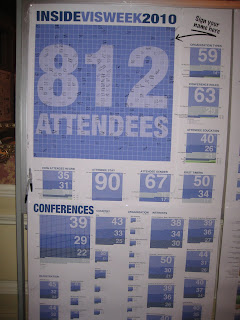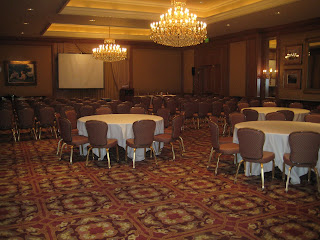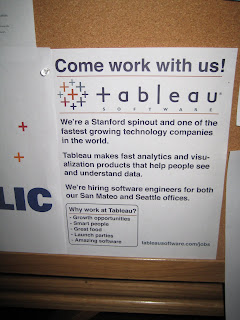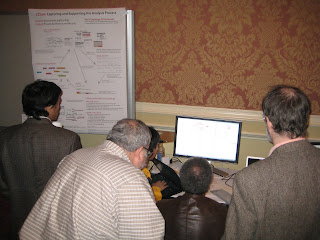 So, it has been about a week since I returned from VisWeek 2010. This year's conference was just as educational and fun and probably more useful to me than last year's conference. There were many more SIAT students there this year than last year and my research group was attending with a different agenda this year.
So, it has been about a week since I returned from VisWeek 2010. This year's conference was just as educational and fun and probably more useful to me than last year's conference. There were many more SIAT students there this year than last year and my research group was attending with a different agenda this year.I was volunteering once again so we flew in on Saturday the day before the conference. I did some registration bag stuffing which was supposed to be 1:45 but was really only 20 minutes because we finished everything. Then in the evening there was a quick training session where they basically read out the online FAQ's about the volunteer tasks. I wasn't doing anymore shifts until Wednesday after VAST.
 This year I began the conference Sunday morning with a 3 minute presentation along with many other 3 minute presentations from award winners involved in the VAST Challenge. It was in this rather small room in front of about 50 people.
This year I began the conference Sunday morning with a 3 minute presentation along with many other 3 minute presentations from award winners involved in the VAST Challenge. It was in this rather small room in front of about 50 people.Those in my CZSaw research group received an award for Mini Challenge 1 and also along with some other students we were given an award for our Grand Challenge entry too. The workshop was all day Sunday with presentations and a panel in the morning. There were some interesting ideas about how to change the challenge for next year. They might add or edit the data halfway through it or they might have a challenge with less of an absolute answer underneath everything (closer to real life challenges).
At lunch Eric and I went out to lunch with Awalin, another grad student from U of Maryland. She won an award in Mini Challenge 3 by using a plagiarism detector on genetic sequence data. Another Mini Challenge 3 winner came from a research group that came up with many crazy ideas when brainstorming solution methods. One involved each genetic stream being used as the pattern for the levels of a zombie video game. His name was Harshawardhan, but if anyone said his name it was usually just shortened to Harsh.
In the afternoon there was a time for everyone to give demos to everyone else although really everyone was just wandering around to others spots and I was busy giving demos half the time so I didn't talk to everyone else. The other half the time Eric was giving demos.
I demoed for Will, a student from UBC who won a VAST challenge with a team from there 3 years ago. He had seen the very early version of my Semantic Zoom View when it was a class project in a class we both took at UBC last fall. Now it is part of CZSaw and it's my thesis project.
I demoed for John Stasko, the professor at Georgia Tech who created the system CZSaw's data views were inspired by. That was great because we had a conversation about how the two systems are different and the hard problems to tackle. When he saw the SZV (that is my thesis) he was interested enough to say that he must get his student to come talk to me about it, so a little later I was demoing it for the student and explaining the algorithms behind it. I don't worry about them copying my approach. Instead I'd be really happy if they did because it'd mean they also think it's useful to analysts. I suppose this is one large difference between academia and the corporate world.
I demoed for Pascale Proulx, a lady from Oculus Info Inc., the leading Visual Analytics software company in Canada. They make really cool temporal geographical software called GeoTime and a visual analytics environment called nSpace. She was there to receive their award for Mini Challenge 1. They have won an award 4 out of 5 years now. She seemed interest in the SZV too, but unfortunately our demo was cut short because the demo session was over. I failed to remember to give her my card and except for her presentation the next day I never saw her again. I believe after the presentation she must have caught a flight out.
Next there was a short discussion about the future of the challenge and then a conclusion. Most of the main challenge organizers are not going to be directly involved anymore and it will need to be run by volunteers so it may be challenging to put one on next year. One of their biggest tasks is making up the fake data for the challenges.
 So Monday and Tuesday there was the Visual Analytics Science & Technology conference (VAST) and I went to almost all the paper sessions for it. There was also a VAST Challenge panel Monday afternoon and my co-supervisor Chris presented for our group. Here's one of the organizers slides announcing our award.
So Monday and Tuesday there was the Visual Analytics Science & Technology conference (VAST) and I went to almost all the paper sessions for it. There was also a VAST Challenge panel Monday afternoon and my co-supervisor Chris presented for our group. Here's one of the organizers slides announcing our award. Here's a slide I made for Chris' presentation that shows my Semantic Zoom View. It helped us to solve the challenge. After the VAST Challenge panel, there were fast forward, 30 second long presentations as trailers for the posters and interactive demos. Eric did you fast forward presentation.
Here's a slide I made for Chris' presentation that shows my Semantic Zoom View. It helped us to solve the challenge. After the VAST Challenge panel, there were fast forward, 30 second long presentations as trailers for the posters and interactive demos. Eric did you fast forward presentation.The last thing left for Eric and I to do with regards to CZSaw was demo it throughout the week. We had registered it as an interactive demo so we at least needed to demo it during the poster sessions Monday and Wednesday evenings. Originally they put us at the dark end of one of the poster rooms. Not many people came by and got a demo.
 Then they moved us to the bright open exhibit room which was packed during the breaks. The reason it was packed was because that's where they put the coffee and the snacks. Here I am with the CZSaw poster, used both during the workshop and the rest of the week in our demo spot.
Then they moved us to the bright open exhibit room which was packed during the breaks. The reason it was packed was because that's where they put the coffee and the snacks. Here I am with the CZSaw poster, used both during the workshop and the rest of the week in our demo spot. One of the people I demoed for is Chris Stolte, vice president of Tableau software. Tableau would be an awesome place to work as they make software for data visualization that is so much better than Excel. I am using Tableau for analysis of my data for the study that's part of my thesis. Anyways, he was impressed enough by CZSaw and the SZV that he asked me what I was currently doing and I said I was graduating soon. Then he said Tableau was hiring. I said I would love to work at a company like Tableau and he said Tableau needs people who can make interactive visualizations like the ones I have made. It was awesome! Of course first I have to focus on graduating. He said he's not allowed to tell me to apply before I have graduated. I said I would not throw away 2 years of my life by just dropping out. I've got to finish first. He went to Stanford but he also did his undergrad at SFU. Anyways, I gave him my card.
One of the people I demoed for is Chris Stolte, vice president of Tableau software. Tableau would be an awesome place to work as they make software for data visualization that is so much better than Excel. I am using Tableau for analysis of my data for the study that's part of my thesis. Anyways, he was impressed enough by CZSaw and the SZV that he asked me what I was currently doing and I said I was graduating soon. Then he said Tableau was hiring. I said I would love to work at a company like Tableau and he said Tableau needs people who can make interactive visualizations like the ones I have made. It was awesome! Of course first I have to focus on graduating. He said he's not allowed to tell me to apply before I have graduated. I said I would not throw away 2 years of my life by just dropping out. I've got to finish first. He went to Stanford but he also did his undergrad at SFU. Anyways, I gave him my card.Throughout the week Eric and I demoed for a variety of students and professors and people from industry. We demoed for Ted Selker, who invented the trackpoint, the little nub in the middle of the IBM thinkpad keyboards that is an isometric joystick for moving the cursor around. I also gave him my card.
 When I was volunteering during the second half of the week Eric did much demoing of CZSaw, sometimes to large crowds. CZSaw definitely got a lot of attention between winning the awards and being demoed throughout the week.
When I was volunteering during the second half of the week Eric did much demoing of CZSaw, sometimes to large crowds. CZSaw definitely got a lot of attention between winning the awards and being demoed throughout the week.With the fun of being a student volunteer I connected with many more students than I otherwise would. However the more useful part of the conference was the demoing of CZSaw that really helped me show my work and skills to some key people in industry. They not only gave us some useful feedback for further development of our tool, but also now hopefully they remember who I am.
